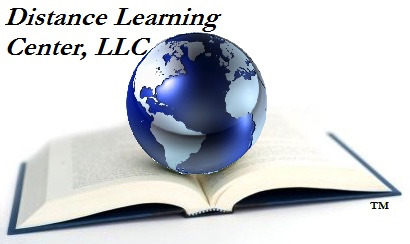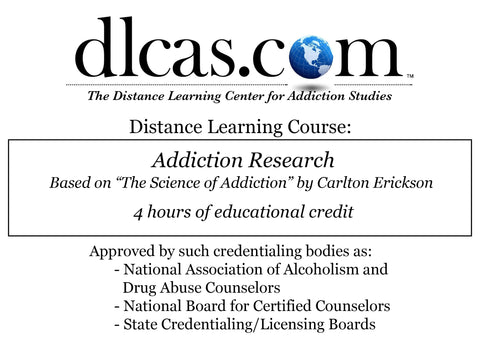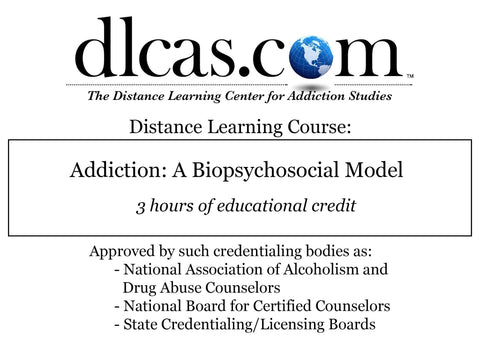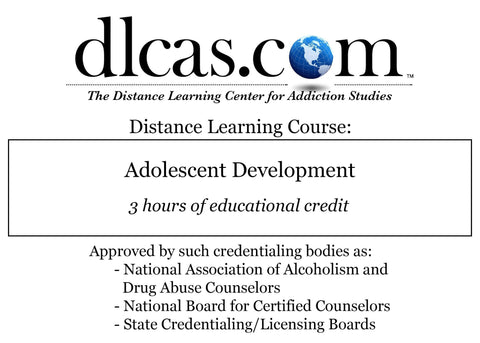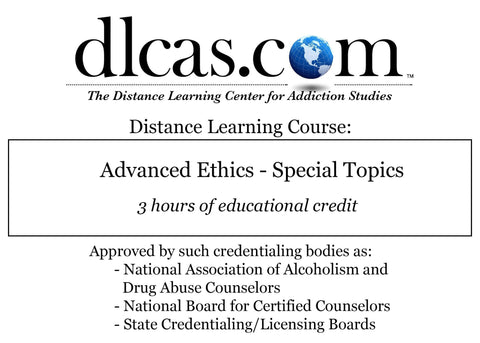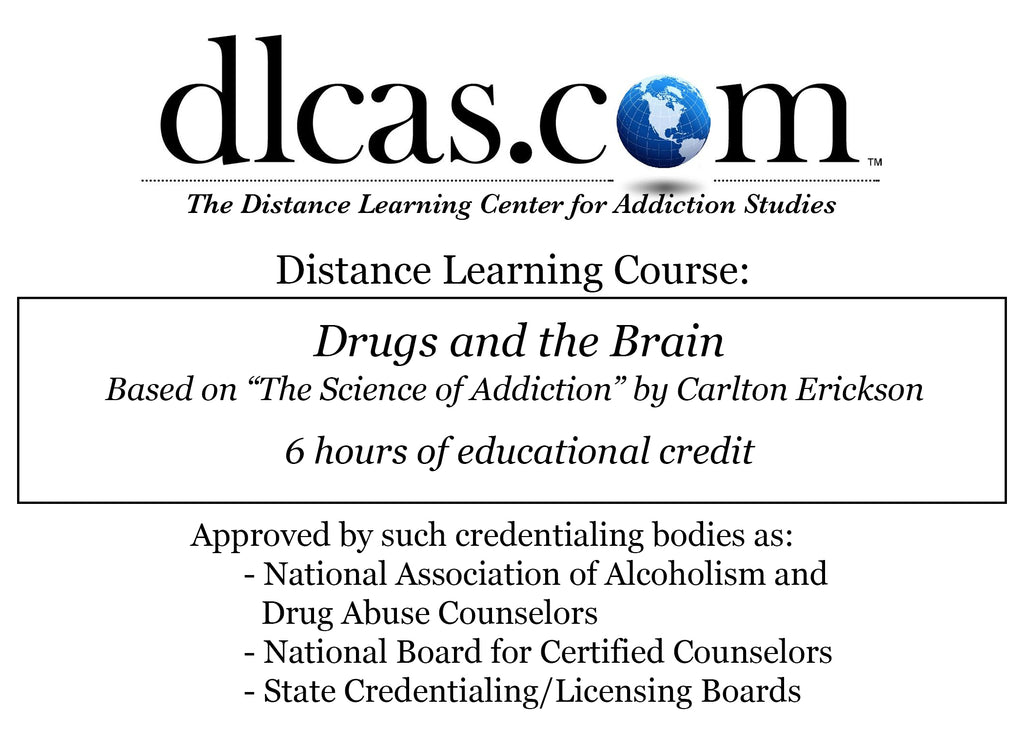
Drugs and the Brain Based on "The Science of Addiction" by Carlton Erickson (6 hours)
This 6 hour course by Carlton Erickson will present a comprehensive overview of the roles that brain function and genetics play in addiction.
Neuroscience is clarifying the causes of compulsive alcohol and drug use – while also shedding light on what addiction is, what it is not, and how it can best be treated – in exciting and innovative ways. Current neurobiological research complements and enhances the approaches to addiction traditionally taken in social work and psychology. However, this important research is generally not presented in a forthright, jargon-free way that clearly illustrates its relevance to addiction professionals.
**IMPORTANT PLEASE NOTE** This course is delivered differently from our traditional coursework. Due to copyright restrictions, you will need to purchase either the hard copy or digital version of Carlton Erickson’s book "The Science of Addiction: From Neurobiology to Treatment (2nd Edition)," published by W.W. Norton & Company. Specific reading assignments will allow you to obtain course credits after passing a posttest.
You may purchase the 2nd edition book from any resource, but we do recommend you consider purchasing directly from W.W. Norton & Company on their website (click here) or from Amazon.com (click here). With Amazon you can purchase a digital copy for use with their free Kindle application at a substantial savings.
Please note: all courses in this series are based on the book you will be purchasing. You will only need to purchase this book once, but can use it for all course if interested. We do offer a discount should you purchase all five courses based on Dr. Erickson’s book.
The courses in this series based on Dr. Erickson’s book are:
- The Terminology of Addiction (3 clock hours of training)
- Dependence Disease Treatment (6 clock hours of training)
- Basic Addiction Pharmacology (9 clock hours of training)
- Drugs and the Brain (6 clock hours of training)
- Addiction Research (4 clock hours of training)
The goal of this series is to help the almost 21.6 million Americans, and millions more worldwide, who abuse or are dependent on drugs by teaching their caregivers (the various helping professionals who provide alcohol and other drug abuse treatment ) about the latest addiction science research. The courses are intended to help addiction professionals understand the foundations and applications of neuroscience, so that they will be able to better empathize with their patients and apply the science to principles of treatment. When professionals learn the proper scientific and clinical terminology, they tend to incorporate it into their everyday language and professional care environment. Thus, the value of these courses is great to those who read it with a goal of learning something new.
This course equips counselors, social workers, psychologists, and all those working in the field with a thorough understanding of the latest neurobiological causes of addiction, thus ensuring a more knowledgeable and effective approach to overcoming the illness.
Goals/Objectives
By participating in this Distance Learning Course the trainee will:
- Examine the structure of the neuron (nerve cells) as the "brains" of the nervous system.
- Learn about the function of neurotransmitters which send chemical "messages" between neurons.
- Develop and understanding of the neurotransmitter Dopamine as one neurotransmitter that is useful in understanding addiction.
- Explore other important neurotransmitters which can be compared to dopamine.
- Learn how drugs interfere with neurotransmitters.
- Review new findings through research which indicate addiction is a disease, and treatable.
- Examine information related to the genetics of chemical dependency.
Carlton (Carl) K. Erickson, Ph.D, a research scientist, has been studying the effects of alcohol on the brain for over 25 years. Carl received his Ph.D. degree in pharmacology from Purdue University in 1965. He has held tenured teaching and research positions at The University of Kansas and The University of Texas since 1969. He presently is the Pfizer Centennial Professor of Pharmacology and Director of the Addiction Science Research and Education Center in the College of Pharmacy at the University of Texas at Austin. He is a member of the Research Society on Alcoholism (RSA), the College for Prevention of Drug Dependence (CPDD), and the American College of Neuropsychopharmacology (ACNP).
Carl is broadly knowledgeable about the alcoholism research literature, since he is an active scientist and Science Editor of the new Betty Ford Center newsletter, Findings. Publisher of over 150 scientific and professional articles, he is also co-editor of the book, Addiction Potential of Abused Drugs and Drug Classes (Haworth Press, 1990), and co-author of Your Brain on Drugs (Hazelden, 1996), and Drugs, The Brain and Behavior (Haworth Medical Press, 1998). He formerly wrote a regular commentary called "Voices of the Afflicted" for, and is now an Associate Editor of, the scientific journal Alcoholism: Clinical and Experimental Research. He has participated in the Professionals in Residence program at the Betty Ford Center in Rancho Mirage, CA and is a recipient of the Betty Ford Center Visionary Award (2000). As a neuroscientist, Carl believes that alcoholism and other addictions are neurochemical disorders which present themselves clinically as different subtypes, each related to a different neurochemical pathology which produces the primary symptom of compulsive drug taking.
Internet Format - Coursework that is available immediately via a downloadable PDF file (a popular online format that requires you to have the Adobe Reader program, or one similar, installed on your computer). Many websites already use this very user friendly file format, so chances are you already have a PDF reader installed on your computer. This format allows faster downloading, easier reading, and easier printing. All course materials will be included, as will the link to the post-test required for course completion. Access and downloading information will be immediately sent to the email address you provide at checkout. There is no additional charge for this format.
USB Flash Drive Format - Different computers, processors, ISP's, and software make it sometimes difficult or time-consuming to capture materials provided via the Internet. As a result, we've added the Flash Drive format to our list of options. With this format we will send you a Flash Drive by Priority Mail that can be used on any computer, laptop, tablet with a USB port. The drive will include a PDF copy of the course or courses ordered along with the test link needed to complete your course using our online test system. This option will include additional per course costs for materials/shipping/handling.
Hard Copy Format - Coursework that is delivered to you by Priority Mail in book form. All course materials will be included, as will the post-test required for course completion. For immediate results and faster certificate processing an email containing instructions on how to access your post-test online will be sent to the email address provided at checkout. Should you not want to submit the test yourself, a mail/fax form is also included that will allow you to mail or fax your test responses to us for processing. Hard copy courses will include additional per course costs for materials/shipping/handling.
